God answered this question for me during a difficult phase of my life.
It was Valentine’s Day, but instead of a special dinner, I sat on the couch and watched my husband go up and down the stairs of our split entry home with boxes and luggage. He was moving out.

One year later I sit on the same couch with no plans. Instead, I replay the scene of my husband’s departure over and over in my mind. I am so engrossed in my thoughts that I jump when the phone rings. At the other end, a familiar voice says, “Just called to invite you to spend Valentines’ Day with our family.”

Embarrassed, I stumble over my words “I don’t want to intrude on your celebration. I will bring everyone down.” The truth is that the memory of one year ago is still raw; and I want to submerge myself in self-pity and ice cream.

My young friend pleads, insists, and finally uses the kids as bait. “I already told the kids you were coming and you don’t want to disappoint them. They love you. We all do. That is what Valentine’s Day is about!” As I hang up the phone, my gloomy mood starts to dissipate. I smile to myself, wishing my former counselor had heard that call.
When my husband indicated he was unhappy and wanted out of the marriage, I had started going to counseling sessions, hoping my husband might come, too. He didn’t. Still, the counselor and I discussed ways to save the marriage—until the session after my husband’s departure. On that day, I told the counselor the marriage was over.
We discussed many things during that session; however, right before I left the office, she looked at me and said, “You’re single now. The women in your church will see you as a threat to their marriage. A support system is important, but you probably need to find it elsewhere.”
Devastated by my husband’s leaving, I was searching for advice on how to cope and move on. Were my ears deceiving me? Did this Christian counselor just tell me to prepare for more abandonment?
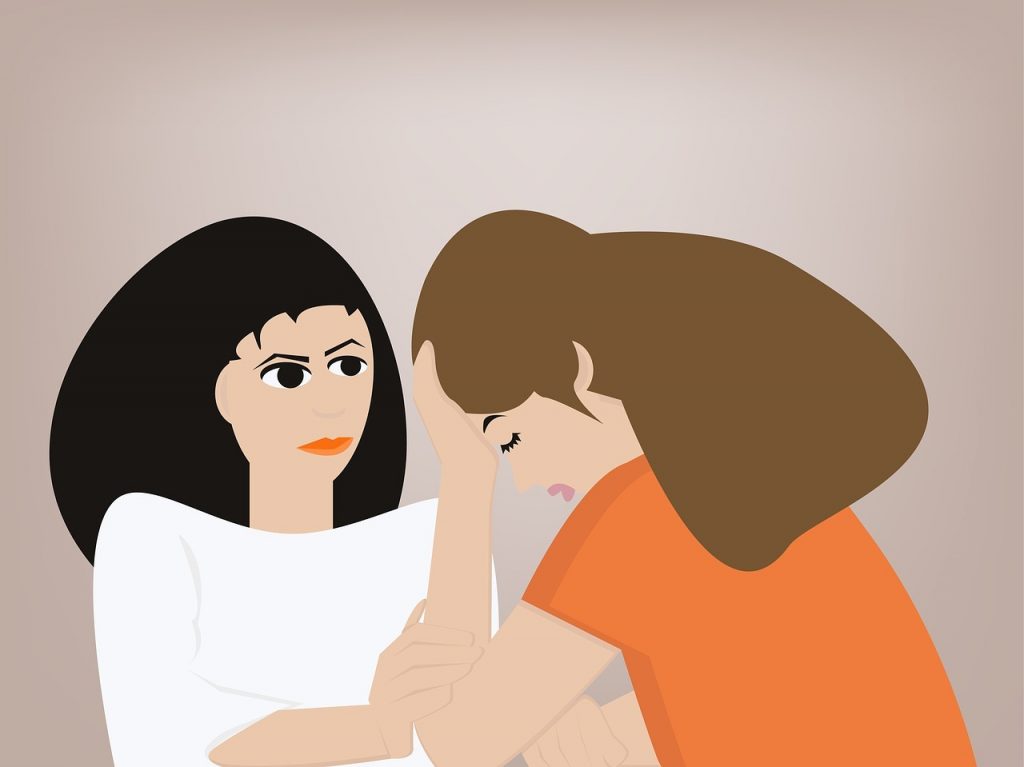
You see, my female counselor bought the lie that women aren’t capable of authentic friendships. Have you ever heard a woman say (or perhaps it was you), “Women are so catty” or “Females are so manipulative?” We trash our own sex and wonder why men say that women can’t be friends.
I didn’t believe women were natural enemies, but the counselor’s words put doubts in my mind and heart. The thought of my church family forsaking me was scary. During the ride home, I was very uneasy.

Questions whirled in my mind. Was the counselor right? Would my sisters in Christ not trust me around their husbands?
Two days later I walked into my church as I did every Sunday morning. But today was different. I was alone and because of my counselor’s words apprehensive.

The pastor was aware of the situation, and others in leadership had been informed. I didn’t know who else knew.
I was the Sunday school superintendent and had to open the service. Could I get through this? I felt broken. I wasn’t sure how to begin. Some looked away. I saw pity on others’ faces. Those who didn’t know were confused by the awkward silence.
As the church matriarch talked with one of the deacons I saw her eyes fill with tears. She walked towards me and gave me a long heartfelt hug. Others followed her lead, offering a deluge of comfort and kind words.
During the next few weeks, the church’s sadness was palpable. One of the members told me there is “a time to mourn,” and this was one of those times. I was comforted that my brothers and sisters in Christ grieved with me.
The next months were full of difficulties, sadness, and obstacles to overcome, but my church family (including the women) were there with me every step of the way. Everyone helped pull me over the wall when I was too weak to climb.

As I made my way through the world of divorce proceedings, there were calls just to talk, offers of financial help, cards with uplifting messages, and of course, prayer.
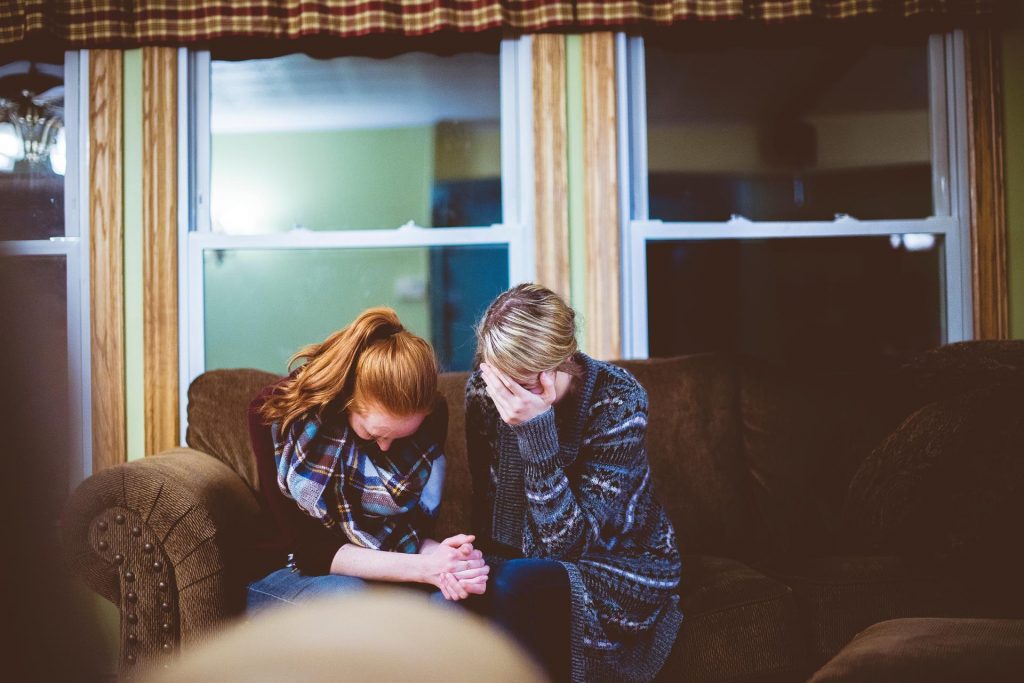
The thoughtful words and acts of kindness during this difficult time were as varied as the people’s individual characters and personalities.
“By this, all will know that you are My disciples if you have love for one another” (John 13:35 NKJV). Jesus does not want the world to know the church because of our intellect, success, power, or cutting-edge programs. He wants the world to know that Christians are different by the way we love one another.
The people of my church exemplified the love Jesus discussed with His disciples. The women, in particular, were there for me throughout it all. Even a year later, this family reached out in love to ease the pain of Valentines’ Day.
Some may say my experience is an exception. Is it? As usual, I look to the Bible for answers. There I found examples of biblical women who cared deeply for one another.
When the land of Canaan (Israel) was being divided between the twelve tribes of Israel, the daughters of Zelophehad were denied property because their father was deceased and there were no sons. These sisters banded together to get inheritance rights. What I like about this story is how the women worked together proving false the stereotype that women always undercut each other. They collaborated and changed the inheritance laws for Jewish women forever. (Numbers 27: 1-11; Joshua 17: 3-4)
Ruth extended love and friendship to her mother-in-law, Naomi. The older woman, to say the least, had a bad attitude. From a human perspective, her sadness was understandable; she had lost a husband and two sons. On the other hand, Ruth must have witnessed Naomi’s faith in earlier years. After all, Ruth was a Moabite, raised in a pagan culture, but now was firmly declaring her faith in the God of Abraham.
When Naomi decided to return to her homeland, Ruth didn’t use this as an excuse to separate herself from a cranky, depressed old woman. She didn’t abandon her for an easier life; instead, she stood by Naomi, demonstrating love and compassion.
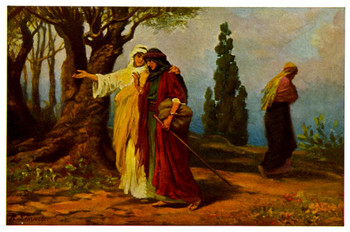
Her merciful actions were rewarded. God secured both women’s futures, and Ruth is even an ancestor of Jesus! (Ruth 1: 11-21 and 4: 13-22)
Another story of loving friendship between two women is Mary and Elizabeth. Mary was to be the mother of the Messiah, and Elizabeth was honored to be carrying John the Baptist. Mary came to visit Elizabeth while both women were pregnant. When Elizabeth greeted Mary, she acknowledged that her cousin was pregnant with the Messiah. She wasn’t jealous of Mary’s status; instead, she was honored that Mary visited. “God has blessed you above all women, and your child is blessed. Why am I so honored, that the mother of my Lord should visit me” (Luke 1: 42b, 43 NLT)?
These two women must have loved one another. Mary traveled during her pregnancy to make this visit, and Elizabeth provided a warm welcome. I imagine Elizabeth, who was older and further along in her pregnancy, told Mary what to expect. Surely they shared a special bond.
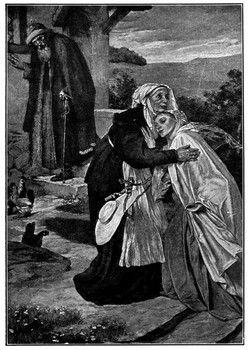
One of my favorite women of the Bible is Dorcas, who ministered to vulnerable widows in society by using her sewing abilities to provide clothes. Only seven verses in Scripture describe this exceptional woman, but we can glean a lot from them. These verses provide a glimpse into a life where peace reigns and women love, care, and support each other. (Acts 9:36-42)
So, was the love shown to me so unusual? Looking at these women of the Bible, I don’t think so. We can encourage one another by sharing times we’ve been on the receiving end of genuine Christian love. More importantly, can you remember a time when you gave this kind love to your sisters in Christ? Please leave your stories in the comment section below. I can’t wait to hear them.
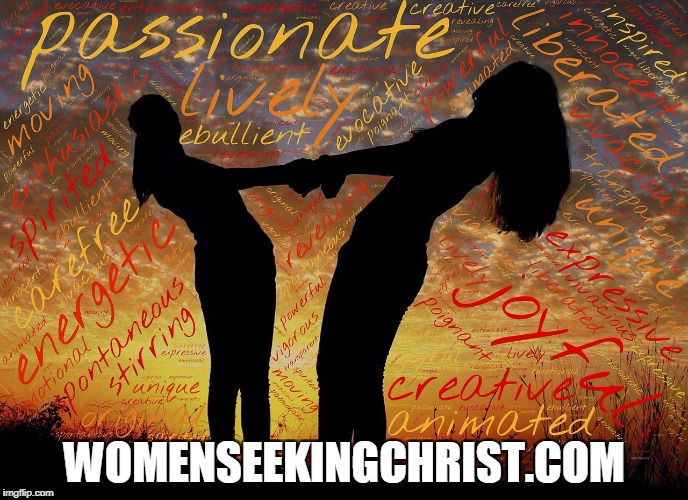
A friend loveth at all times, and a brother is born for adversity (Proverbs 17:17 KJV).

I was just recently blessed by a lady I just started to get to know at church who asked me to participate in a Bible study she’s leading. I said I couldn’t because we are moving unexpectedly. I thought that would be the end of it and she actually suggested that we talk every week over the phone to discuss the study and keep accountable. I am really surprised and excited by her reaching out to me like this!
I think I need to do more reaching out to other women. What gets in my way is business or feeling insecure because I feel like they don’t want or need me to.
I totally get that. I often feel like I am intruding. That the person is thinking that I am pushy and would prefer I just go away.
Greetings from Idaho! I’m bored to tears at work so I decided to browse your blog on my iphone during lunch break. I really like the info you present here and can’t wait to take a look when I get home. I’m surprised at how fast your blog loaded on my phone .. I’m not even using WIFI, just 3G .. Anyways, very good blog!
neodymium magnets ebay http://christinedawn.classtell.com/crushermaster/thingsyouneedtotakeintoconsiderationbeforeacquiringcrusherparts
This is really interesting, You’re an overly skilled blogger. I’ve joined your rss feed and look forward to in the hunt for extra of your excellent post. Also, I’ve shared your website in my social networks
animal onesies for adults https://evettewealer.jouwweb.be/sorts-of-designs-you-could-get-onesies-for-adults
An impressive share! I’ve just forwarded this onto a friend who had been conducting a little homework on this. And he in fact ordered me dinner due to the fact that I found it for him… lol. So let me reword this…. Thanks for the meal!! But yeah, thanks for spending some time to discuss this subject here on your internet site.
mink lashes in bulk https://meroyteresa.skyrock.com/3315863844-Why-Are-Mink-Lashes-Better-Compared-To-Routine-False-Lashes.html
I just now could hardly disappear completely your website in advance of implying that that we highly treasured the common details individuals video youtube terbaru supply for your attendees? Will be back again continually to check out completely new discussions
I’m not that much of a internet reader to be honest but your sites really nice, keep it up! I’ll go ahead and bookmark your site to come back down the road. Many thanks
It is perfect time to make some plans for the future and it’s time to be happy. I’ve read this post and if I could I desire to suggest you some interesting things or suggestions. Maybe you could write next articles referring to this article. I desire to read more things about it!
sloth pajamas https://bennyrevelo.page.tl/Best-designs-of-onesies-for-adults-that-you-can-locate-in-on-the-internet-shop.htm
I would like to thank you for the efforts you’ve put in penning this site. I am hoping to check out the same high-grade content by you in the future as well. In truth, your creative writing abilities has motivated me to get my very own blog now 😉
My partner and I stumbled over here coming from a different web page and thought I may as well check things out. I like what I see so now i’m following you. Look forward to exploring your web page repeatedly.
Cleo Saporita http://bbs.rh.gov.cn/home.php?mod=space&uid=151260&do=profile&from=space
These are really wonderful ideas in concerning blogging. You have touched some good points here. Any way keep up wrinting.
baby onesie animal http://alonalebeck.postbit.com/allow-me-present-you-to-animal-onesies-in-detail.html
Hi! I just wanted to ask if you ever have any trouble with hackers? My last blog (wordpress) was hacked and I ended up losing months of hard work due to no backup. Do you have any solutions to prevent hackers?
pink stitch onesie http://vickyzora.blogmaster.net/post-unicorn-onesie-suitable-as-well-as-really-fascinating-for-residence-537996.html
Definitely believe that which you stated. Your favorite reason appeared to be on the web the easiest thing to be aware of. I say to you, I definitely get annoyed while people consider worries that they plainly do not know about. You managed to hit the nail upon the top and defined out the whole thing without having side effect , people can take a signal. Will probably be back to get more. Thanks
ブランドスーパーコピー優良店 https://www.hsq.de/index.php/kontakt
Your blog on CAN WOMEN BE FRIENDS? – WSC Test Site is great. I hope you can continue writing many lot article . Viva wsc.madestronger.com
This is my first time visit at here and i am actually pleassant to read everthing at single place.
確実ã«å±Šãスーパーコピー http://www.sirensofchrome.com/sirens/?p=636
It’s awesome in favor of me to have a web site, which is good in support of my experience. thanks admin
スーパーコピーブランド専門店å£ã‚³ãƒŸ http://elementpc.ca/contact/client-tools/
It is actually a great and useful piece of info. I am satisfied that you simply shared this useful information with us. Please keep us up to date like this. Thanks for sharing.
ãƒãƒ¬ãƒ³ã‚·ã‚¢ã‚¬ã‚³ãƒ”ー代引ã https://www.tanybox.fr/page/5/
Heya this is kind of of off topic but I was wanting to know if blogs use WYSIWYG editors or if you have to manually code with HTML. I’m starting a blog soon but have no coding knowledge so I wanted to get advice from someone with experience. Any help would be enormously appreciated!
ブランドスーパーコピー優良店 http://minsoctrud.astrobl.ru/content/opeka
If some one needs expert view concerning blogging after that i propose him/her to visit this blog, Keep up the fastidious work.
Hipolito Montaivo http://poster.berdyansk.net/user/ElaneDuncan70/
I would not also recognize how I found themselves listed here, nonetheless assumed this kind of organize ended up being good. I can’t know your identiity yet unquestionably you are likely to any renowned writer for those who usually are not previously aplikasi prediksi saham indonesia. Many thanks!
I have been surfing online greater than 3 hours today, but I by no means found any interesting article like yours. It’s beautiful worth enough for me. In my view, if all website owners and bloggers made excellent content as you did, the net can be much more helpful than ever before.
ジャガールクルトコピー http://theosophicalsocietyinmaryland.org/news/
I’ve been browsing online more than 2 hours today, yet I never found any interesting article like yours. It’s pretty worth enough for me. In my view, if all webmasters and bloggers made good content as you did, the internet will be much more useful than ever before.
スーパーコピー時計優良店 https://www.hexhamabbey.org.uk/weddings
Anyone specifically make significantly articles or blog posts I’d condition.. aplikasi android rekomendasi saham indonesia This can be the very first time that I actually frequented your internet-site webpage and so much? My partner and i stunned together with the study you have made for making this type of submit incredible. Magnificent career!
I’m really inspired along with your writing talents and also with the format in your blog. Is that this a paid subject matter or did you modify it yourself? Anyway keep up the nice high quality writing, it’s uncommon to look a nice blog like this one today..
スーパーコピー https://www.abreg.com/about-us/
Hello to all, how is the whole thing, I think every one is getting more from this web page, and your views are fastidious designed for new viewers.
First off I want to say wonderful blog! I had a quick question in which I’d like to ask if you do not mind. I was curious to know how you center yourself and clear your thoughts prior to writing. I’ve had a tough time clearing my thoughts in getting my thoughts out there. I do enjoy writing however it just seems like the first 10 to 15 minutes are generally wasted simply just trying to figure out how to begin. Any recommendations or tips? Many thanks!